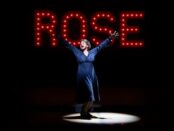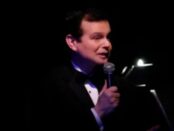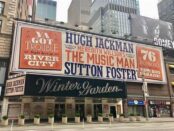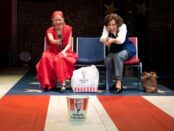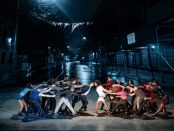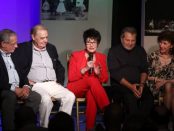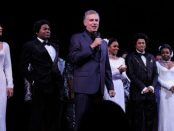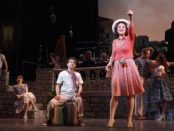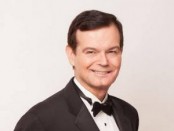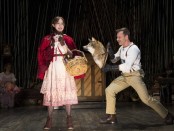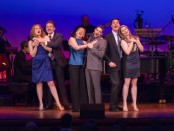Stephen Sondheim
Stephen Sondheim is an American composer and lyricist known for his immense contributions to musical theatre for over 50 years.
He is the winner of an Academy Award, eight Tony Awards (more than any other composer) including the Special Tony Award for Lifetime Achievement in the Theatre,[1] eight Grammy Awards, a Pulitzer Prize and the Laurence Olivier Award. His most famous works include (as composer and lyricist) A Funny Thing Happened on the Way to the Forum, Company, Follies, A Little Night Music, Sweeney Todd, Sunday in the Park with George and Into the Woods. He also wrote the lyrics for West Side Story and Gypsy.
Brian Stokes Mitchell, Andrea Rosa Guzman, Christopher Jordan and Kate Baldwin in the opening scene [more]
Forbidden Broadway: Merrily We Stole a Song
The spate of Sondheim shows both this past season and opening this fall is given prime place in this musical revue. Unsurprisingly, the new "Merrily We Roll Along" which ran all of last season comes in for the most ribbing as the subtitle hints. Collins-Pisano plays Daniel Radcliffe in a parody of the show’s “Good Thing Going” and then is joined by Stern and Hayward as his co-stars Lindsay Mendez and Jonathan Groff as they review the troubled history of the show which famously flopped in its first Broadway iteration in 1981 in a revised version of the song “Old Friends.” Collins-Pisano sings to that show’s “Franklin Sheppard, Inc.” about Radcliffe's stage career after the Harry Potter films. This is followed by a tribute to "Company" which had a female Bobby to the tune of “Bobby, come on over for dinner.” Most if not all of the "Forbidden Broadway" revues have featured one of its actresses as the ubiquitous Patti LuPone and here we have Stern belting “The Ladies Who Crunch,” the scenery that is, satirizing "Company"’s most famous song. [more]
Lempicka
In telling the life story of Tamara de Lempicka, the show begins with a fascinating premise. Unfortunately, neither the score nor the book lives up to her high standards. Unlike "Sunday in the Park with George" which showed us the workings of the artistic process, "Lempicka" is more interested in the social aspects of the 1920’s and 1930’s Paris than in Tamara’s revolutionary paintings. The cast works hard to put over the new musical but they are defeated by commonplace situations, banal song lyrics, and over-used pronouncements. The musical of Tamara de Lempicka’s life still has to be told. [more]
The Frogs
MasterVoices acquitted itself well in this deliciously comic concert staging of "The Frogs." Why this Stephen Sondheim score is not better known or revived more often remains a mystery after seeing the fine production that fit the Fredrick P. Rose Hall of the Rose Theater. Hopefully, this concert will lead to more fully staged productions now that MasterVoices demonstrated how many star turns are available in this comic masterpiece by Shevelove, Lane and Sondheim. [more]
Stereophonic
Not since Stephen Sondheim’s "Sunday in the Park with George" have “civilians” gotten so close to the creative individual’s “process” when attending a theater piece. David Adjmi’s "Stereophonic" is an intensely personal work that examines the creation of a rock album, a group’s follow-up to a late-blooming debut, in the very competitive music scene of the 1970’s. As the characters in the play have been compared to the celebrated Fleetwood Mac members in many articles appearing before the opening of this production, it’s safe to say this is an exquisite fantasia on the creation of the now-legendary rock masterpiece known as "Rumours," an album firmly in Rolling Stone Magazine’s Top 10 of “The 500 Greatest Albums of All Time.” [more]
Gutenberg! The Musical!
How much you enjoy 'Gutenberg! The Musical!" likely depends on a combination of factors entirely unrelated to that German fellow: familiarity with the tropes it's skewering; your own level of disdain for such hackney execution; and your tolerance for Rannells and Gad's incessant mugging. In their first Broadway pairing since "The Book of Mormon" over a decade ago, Rannells and Gad are less a comic team than a comic rivalry, with neither willing to be the Abbott to the other's Costello. Fortunately, their ping-ponging, look-at-me dynamic only occasionally grows tiresome, usually when either of them is trying to gin up laughs that aren't there or shouldn't rise above a tee-hee. [more]
One Night Only: An Evening with Heather Headley and The New York Pops
Pairing The New York Pops with Broadway star Heather Headley brought out the best in each. The energy zipping between the orchestra’s music director Steven Reinecke and Headley was palpable. The program was a wonderful musical portrait of Headley. Reinecke, and Headley’s accompanist and personal music director, Ron Colvard did not just support her but became “the wind beneath her wings.” [more]
Richard Holbrook: “Christmas Magic in the Big Apple”
"Christmas Magic in the Big Apple" continues Richard Holbrook's many years of presenting Christmas season shows. What sets his productions apart from many other performers is his view that this time of year is a time for celebrating family and friends. It is not simply a time of religious holidays but more of an all-encompassing recognition of the joyous spirit that moves people to engage with one another in a celebration of life. His shows are a creative mix of holiday songs with a universal theme. Holbrook commented, “Not everyone celebrates Christmas, and I don't want people coming to my show being made to feel uncomfortable." His playlists over the years have exemplified that view, with the current show being the latest in the series. [more]
On the Town with Chip Deffaa: At the Museum of Broadway
Everyone who loves theater owes a debt of gratitude to Julie Boardman and Diane Nicoletti. About five years ago, they got the idea of creating a museum in the theater district, dedicated to Broadway. They would raise the funds themselves, hoping to create a self-sustaining operation. The museum they have co-founded has now opened. And it’s a winner! Oh, I’m not saying it’s perfect. Nothing in this world is quite perfect. And like all new ventures, the museum is experiencing some growing pains. (Later in this piece, I’ll suggest some ways that the museum could be made even better.) But what they’ve achieved thus far is mighty impressive. There are a few kinks to be ironed out, but this is a major addition to the theater district. [more]
Into the Woods
Patina Miller as The Witch in a scene from the New York City Center Encores! Production of “Into [more]
Anyone Can Whistle
Although when MasterVoices chose the third of the four Stephen Sondheim/Arthur Laurents collaborations, "Anyone Can Whistle," as part of their 80th season at Carnegie Hall, they had no way of knowing that it would prove to be a memorial to the late Mr. Sondheim rather than a tribute. This rarely revived show, now considered a “cult classic,” a euphemism for a quick flop in 1964 running only nine performances, was ahead of its time, attempting a new form, one that Sondheim has called “the first absurdist musical.” Performed by stars Vanessa Williams, Santino Fontana, Elizabeth Stanley, Douglas Sills, Eddie Cooper, Michael Mulheren, and Joanna Gleason as the narrator, it was beautifully sung under the direction of maestro Ted Sperling, but can’t hide the fact that Laurents’ libretto is extremely scattershot taking on far too many targets for one show. Subtitled “A Musical Fable” in its first publication, the musical is really a cartoon satirizing everything imaginable. The theme is one of individualism versus conformity, a big trope for shows and movies in the turbulent 1960’s, now symbolized by the more famous "King of Hearts" (1966), "Your Own Thing" (1968), "HAIR" (1968) and "Easy Rider" (1969). [more]
A Few Thoughts on Those Needless Changes to “The Music Man”
I want to be clear. "The Music Man" is such a masterfully written musical that making some changes here and there can’t really ruin it; but changes are not needed in this show and they certainly don’t help. I believe in the old saying: “If it ain’t broke, don’t fix it!” I also believe, as Tommy Tune once told me years ago in discussing a different show, many producers and directors feel a need to tinker with shows, making changes for the sake of making changes, even when the wiser choice would be to simply leave things alone. There’s just that desire to “improve” things, whether or not the changes actually improve anything. [more]
Company
This theatrical genius, responsible for the Tony Award winning plays "War Horse," "The Curious Incident of the Dog in the Night-Time" and the most recent revival of "Angels in America," knew that this 1970 musical comedy about a man about to turn 35 and having all his coupled friends trying to marry him off would seem dated in 2018 when she conceived of this version in London, in which the gender of the characters are reversed. With the help of another genius, composer/lyricist Stephen Sondheim who rejiggered his wise and witty lyrics, Elliott has made this old show by bookwriter George Furth seem spanking new as if we had never seen it before even though this is the fourth New York revival. [more]
Assassins
As always in a John Doyle presentation, the production is professional, polished and accomplished. This time around he has not made changes to the script or the score except to include the climactic song “Something Just Broke” which was not in the original Off Broadway production but was added to the first London version in 1992 and has been used ever since. While the actors give excellent performances, the revival lacks emotion and heart which is strange considering the number of characters who die or who are wounded in the course of the show. It is as though they (and we) are numbed by much depiction of killing. Is there a way to fix this in a show which repeatedly has its cast shooting at presidents of the United States, in this case only in a fun house setting? [more]
West Side Story
Van Hove's energetic cast is too often lost among the video images which is sad because they are a wonderfully scrappy group of actor/dancer/singers who give their all. (I’m told that this is less of an issue in the higher reaches of the theatre due to the difference in perspective.) To be sure, there are wonderful moments where the groups move about in cityscapes that constantly change around them, but these are countered by long scenes during which the actors appear to be lilliputian figures whose singing and emoting get lost in the confusion of giant faces. [more]
92Y’s Lyrics & Lyricists Series: “Sondheim: Wordplay”
Tony Award-winning choreographer Christopher Gattelli’s direction melded the performers with expert physical placement sprinkled with occasional dance bits that made for lively presentation. The event’s visual verve was amplified by the imaginative projection design by Dan Scully. In addition to illustrative images there were projections of Sondheim’s handwritten and typed lyrics as well as stylized photographic views. These were all continually shown on the auditorium’s back wall, beautifully complementing the performers and the speakers. [more]
Merrily We Roll Along
Usually considered one of Sondheim’s lesser musicals, albeit with one of his best scores--and needless to say, that’s saying a lot--this production provides a heft and a story that are sorely lacking in previous versions. There is no denying or gainsaying its power to impress, as each and every song comes through with its capacity to build characters and tell stories. If the stories are less than satisfying in earlier productions, that’s due more to bookwriter George Furth (adapting the original play by George S. Kaufman and Moss Hart) than to Sondheim or to his other collaborators, each of who has provided an impeccable contribution to the current enterprise. [more]
The New York Pops – Song and Dance: The Best of Broadway
The New York Theatre Ballet performed the lovely, all-female, “Come to Me, Bend to Me” from that musical, a sweet look at pre-wedding preparations in the ancient village of Brigadoon. That troupe began with two excerpts from de Mille’s groundbreaking “Dream Ballet” from "Oklahoma!" and her “Hornpipe” from another Rodgers and Hammerstein classic, "Carousel" (1945), its fishermen bouncing about while on the hunt for female companionship. [more]
Book review: “Sense of Occasion” by Harold Prince
The first 26 chapters are the original text of "Contradictions" with each followed by “”Reflections,” where Prince variously corrects, expands upon and ruminates about that portion. After concluding with the tribulations of the 1974 revival of "Candide," the next 19 chapters are new additions that detail all that came after. There’s also a comprehensive appendix of facts about all of his shows and an index. [more]
Cool! The 60th Anniversary and Reunion Event: West Side Story
Each was asked about their first audition. Marilyn D’Honau couldn’t remember, although she clearly made an impression on Robbins who subsequently used her in "Gypsy." Tony Mordente, just an acting hopeful, was working in a Times Square Howard Johnson’s when he heard that WSS was being assembled and he showed up with no professional experience and managed to impress the powers-that-be. Some flew in from the Coast or Las Vegas or were known by Robbins before hand, like Ronnie Lee who was in "Peter Pan." All were reminded by Robbins before the opening night that they were “handpicked.” [more]
Pacific Overtures
The playing space designed by Doyle is a narrow white runway with a stool at one end and at the other, an archway created by continuing the flooring into the air on which Japanese writing appears as on a banner. The audience sits in stadium-type seating on either side of the playing space. Eschewing pageantry, the production puts the cast in very bland outfits of black, grey, white, blue or beige (costumes by Ann Hould-Ward), adding fabric or robes when absolutely necessary. The lighting by Jane Cox occasionally bathes the stage in either red or blue mood lights. [more]
Writer Ron Fassler on His New Book and Theater Adventures
Actor, writer and director Ron Fassler [avatar user=”Courtney Marie” [more]
Candide (New York City Opera)
Linda Lavin, padded and badly bewigged, comes across more like a Jewish yenta than the victim of the vagaries of Eastern European warfare. She has only one song, “Easily Assimilated,” a silly attempt at seduction, which is a shame. This character had several numbers in the original, including one that actually referred to why she is “missing the half of my backside.” Lavin is a star, but is ill-used here. [more]
Richard Holbrook: “Always December”
“The Little Drummer Boy” was an emotionally shattering highlight of Richard Holbrook: "Always December." Mr. Holbrook’s performance of this perennial was revelatory due to the intensity he brought to it. This was performed in tandem with the equally moving “Some Children See Him.” [more]
ON THE TOWN with Chip Deffaa …. for July 5th, 2016
I’ve always liked Andrew Keenan-Bolger's work. He was a memorable child actor, playing leads on Broadway in shows like "Beauty and the Beast" and "Seussical," when he was around 13 or 14 years old. I admired his sunny, open-hearted work then. And he's even more successful today (at age 31) as an adult--not every child actor can make such a transition. He conveys the same sort of buoyant spirit on stage now as he did when I first saw him in those shows he did so well as a youth.. (His whole family is talented. He and his sisters, Celia Keenan-Bolger and Maggie Keenan-Bolger, are all making their contributions to the arts.) [more]
Broadway Producer John Breglio Shares Secrets of Life in the ‘Biz’ and What It Takes to Succeed
The primary reason I wrote this book was for people to appreciate exactly what it is to be a producer. He or she has to be the captain of the ship in every respect – they start with the idea and then get the rights to a book. Then you have to find the writers, the composers, and the lyricists, and put them together and guide them, and then you have to raise the money, figure out where the show is going to be presented, do the marketing and advertising - - you have to really do it all. You need to have a producer who has the objectivity and the passion to see the show through from beginning to end. Someone has to make sure it all comes together and that’s the role of a producer. It becomes even more essential once a show opens – you have to continue with the marketing and advertising and work hard to keep it fresh. It’s a very complicated and difficult job and you need the knowledge and experience to have a chance at success -- especially if you want to do it on Broadway. [more]
92nd Y’s Lyrics & Lyricists Series: I Have Confidence: Rodgers After Hammerstein
Above the stage on a screen throughout the presentation were projected photographs illustrating Rodgers’ career and appropriate backdrops for the locales of the shows. Brief insightful video interviews with Rodgers’ daughter Linda, lyricists Sheldon Harnick and Martin Charnin, playwright Sherman Yellen, historian Ken Bloom, Rodgers grandson Peter Melnick, record producer Thomas Z. Shepard, and the actor John Cullum were shown. A 1974 Public Television interview conducted by James Day showed the aged Rodgers ravaged by strokes and throat cancer but still vital and articulate. [more]
Do I Hear a Waltz?
Ms. Errico gives a smashing musical theater performance. Her gutsy broad that’s tough on the outside and unraveling on the inside characterization is quite captivating. Her singing of several of the wan attempts at showstoppers exhibits her charismatic range. It’s definitely a case of a performer elevating weak material with their talents. Her commitment is as intense here as if she were playing either Sally or Phyllis from Follies particularly for the boozy ode to self pity, “Everyone Loves Leona.” [more]
Richard Holbrook: Richard Sings Rodgers with a Lot of Heart – Revised and Updated
As always, Holbrook was dapper in his signature tux and brought real class and style to the stage. His rich, tenor voice was soothing to the ears and stirred the packed audience, mostly an older crowd, into reminiscing with him about the old days when these songs were written. Their enthusiasm was undeniable, underscored by their continuous applause. Holbrook's vocal instrument is not particularly robust but, what he lacks in volume, he makes up for in passion; a great interpreter, he really feels the music and sings with a lot of heart just like the title of his cabaret. This, along with his great stage presence, connects him with his audience and they find themselves being reeled in.
[more]
Broadway by the Year: The Broadway Musicals of 1916-1940
Director Mindy Cooper’s very well executed transitions between the show’s 27 numbers, the personable Scott Siegel’s erudite remarks, and the variety of gifted performers who participated made "Broadway by the Year: The Broadway Musicals of 1916-1940" a brisk and very enjoyable event. [more]
Into the Woods
Why another stage production of the Stephen Sondheim-James Lapine "Into the Woods" while the film version is currently playing? The Roundabout Theatre Company is hosting the ingenious, clever and witty Fiasco Theater production (previously seen at the McCarter Theatre Center in 2014) of this iconic musical using fairy tales from the Brothers Grimm which is the best musical revival in town. This is what every revival should be – a reinvention of the original material making it new enough that it wipes out memories of the original. If you did not see Fiasco’s six-character version of Shakespeare’s Cymbeline which had an extended run Off Broadway in 2011, then you are in for a delightfully surprising treat. [more]
92 Y’s Lyrics & Lyricists Series: “A Good Thing Going: The Stephen Sondheim and Harold Prince Collaboration”
Hearing these Sondheim classic songs well performed and seeing them vibrantly staged was reason enough for this concert to be considered a success. That it also paid tribute to the artistry of Harold Prince with its revelatory documentary presentation made it an even more glorious event. [more]


